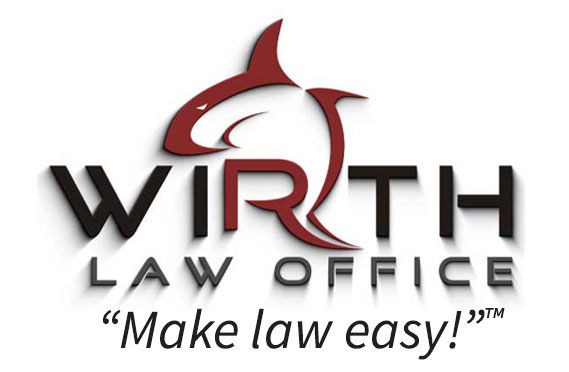Wagoner Lawyer Blog
Reporting Child Abuse or Neglect in Wagoner Oklahoma
 Reporting child abuse or neglect is a critical responsibility in Wagoner, Oklahoma. Understanding what constitutes abuse, the legal requirements for reporting, and the steps involved are essential to protect vulnerable children. Anyone who suspects abuse must report it immediately to the authorities. Failure to report can result in criminal charges and civil liability. Seeking the guidance of a Wagoner child custody attorney can provide tailored advice and representation. Protections are in place for those who report abuse in good faith. Contact Wirth Law Office for experienced legal assistance in handling child abuse or neglect cases in Wagoner, Oklahoma. Read more »
Reporting child abuse or neglect is a critical responsibility in Wagoner, Oklahoma. Understanding what constitutes abuse, the legal requirements for reporting, and the steps involved are essential to protect vulnerable children. Anyone who suspects abuse must report it immediately to the authorities. Failure to report can result in criminal charges and civil liability. Seeking the guidance of a Wagoner child custody attorney can provide tailored advice and representation. Protections are in place for those who report abuse in good faith. Contact Wirth Law Office for experienced legal assistance in handling child abuse or neglect cases in Wagoner, Oklahoma. Read more »Visitation Rights for Grandparents in Wagoner Oklahoma
 It is important to note that the court gives considerable weight to the wishes of the child's parents. If both parents are alive, together, and object to the visitation, the court will presume that grandparent visitation is not in the best interest of the child. Overcoming this presumption requires clear and convincing evidence
Read more »
It is important to note that the court gives considerable weight to the wishes of the child's parents. If both parents are alive, together, and object to the visitation, the court will presume that grandparent visitation is not in the best interest of the child. Overcoming this presumption requires clear and convincing evidence
Read more »Adoption Rights for Same-Sex Couples in Wagoner County
 Oklahoma law does not prohibit same-sex couples from adopting children. The state's adoption statutes are designed to promote the best interests of the child, regardless of the adoptive parents' sexual orientation. According to Oklahoma law, any adult, whether single or married, can petition to adopt a child.
Read more »
Oklahoma law does not prohibit same-sex couples from adopting children. The state's adoption statutes are designed to promote the best interests of the child, regardless of the adoptive parents' sexual orientation. According to Oklahoma law, any adult, whether single or married, can petition to adopt a child.
Read more »Rights of Foster Parents in Wagoner Oklahoma
 Navigating the foster care system can be complex, and foster parents may encounter various legal challenges. Seeking the assistance of a Wagoner guardianship lawyer can provide foster parents with the necessary legal guidance to advocate for their rights and the best interests of the child.
Read more »
Navigating the foster care system can be complex, and foster parents may encounter various legal challenges. Seeking the assistance of a Wagoner guardianship lawyer can provide foster parents with the necessary legal guidance to advocate for their rights and the best interests of the child.
Read more »Visitation Rights for Non-Custodial Parents in Wagoner Oklahoma
 In Wagoner, Oklahoma, the issue of visitation rights for non-custodial parents is both sensitive and legally complex. Oklahoma recognizes the importance of maintaining a child\'s relationship with both parents post-divorce. Visitation rights, or parenting time, are crucial for a child\'s well-being, providing stability and continuity. Read more »
In Wagoner, Oklahoma, the issue of visitation rights for non-custodial parents is both sensitive and legally complex. Oklahoma recognizes the importance of maintaining a child\'s relationship with both parents post-divorce. Visitation rights, or parenting time, are crucial for a child\'s well-being, providing stability and continuity. Read more »Enforcement of Child Support Orders in Wagoner Oklahoma
 Child support orders are legally binding directives issued by the court requiring the non-custodial parent to provide financial support to the custodial parent for the benefit of their child. These orders are based on several factors, including the income of both parents, the needs of the child, and the standard of living the child
Read more »
Child support orders are legally binding directives issued by the court requiring the non-custodial parent to provide financial support to the custodial parent for the benefit of their child. These orders are based on several factors, including the income of both parents, the needs of the child, and the standard of living the child
Read more »Same-Sex Divorce Proceedings in Wagoner Oklahoma
 Oklahoma recognizes both no-fault and fault-based grounds for divorce. The most common ground is incompatibility, which does not require proving wrongdoing by either party. However, when there is a minor child involved both parties to a divorce filed on the ground of incompatibility are required to attend an educational program about the impact of divorce.
Read more »
Oklahoma recognizes both no-fault and fault-based grounds for divorce. The most common ground is incompatibility, which does not require proving wrongdoing by either party. However, when there is a minor child involved both parties to a divorce filed on the ground of incompatibility are required to attend an educational program about the impact of divorce.
Read more »The Adoption Process in Wagoner County
 Adoption is a significant and life-changing event for all parties involved. In Wagoner County, Oklahoma, the adoption process is governed by a series of laws and procedures designed to ensure the best interests of the child are met while providing legal stability for adoptive families. This blog post provides a comprehensive overview of the adoption process in Wagoner County and explains the importance of consulting with a [Wagoner adoption attorney](https://www.wagonerlawyer.com/law/family-law/wagoner-adoption-attorney.html) for personalized guidance and representation.
Types of Adoption in Wagoner County
Adoptions in Wagoner County can generally be categorized into several types: agency adoptions, independent adoptions, stepparent adoptions, and relative adoptions. Each type has its unique legal requirements and procedures.
Agency Adoptions: These adoptions are facilitated by licensed adoption agencies that match prospective adoptive parents with children available for adoption. The agency handles most of the legal and procedural aspects, ensuring compliance with state regulations.
Independent Adoptions: With this type of adoption prospective parents work directly with the birth parents to arrange the adoption. This type requires careful navigation of legal requirements to ensure the adoption is valid and legally binding.
Stepparent Adoptions: When a stepparent wishes to adopt their spouse's child, they must obtain the consent of the other biological parent, unless that parent's rights have been terminated. The process is generally more straightforward but still requires legal proceedings.
Relative Adoptions: These involve a relative adopting a child, often in situations where the biological parents are unable to care for the child. This type of adoption can sometimes be expedited but still requires adherence to legal protocols.
Legal Requirements for Adoption
Prospective adoptive parents must meet certain eligibility criteria under Oklahoma law. An unmarried individual must be at least 21 years old to be eligible to adopt a child. A husband and wife can jointly adopt a child only if both spouses are 21 years of age or older (Okla. Stat. tit. 10 § 7503-1.1).
Those who are legally separated from a spouse can adopt as long as the adopting individual is over 21 years of age. A stepparent who is married to a parent of the child or a spouse of a relative of the child can adopt the child regardless of if the individual has reached the age of 21 (Okla. Stat. tit. 10 § 7503-1.1).
The adopting individual must also be financially stable, in good physical, and sound mental health. Background checks, home studies, and interviews are conducted to ensure a safe and supportive environment for the child.
The Home Study
A critical component of the adoption process is the home study, which evaluates the suitability of the adoptive home. The home study includes background checks, home inspections, and interviews with the prospective parents and other household members (Okla. Stat. tit. 10 § 7505-5.3). The home study must also be conducted by a licensed social worker (Okla. Stat. tit. 10 § 7505-5.4).
Termination of Parental Rights
Before an adoption can be finalized, the parental rights of the biological parents must be terminated. This can occur voluntarily, where the birth parents consent to the adoption, or involuntarily, through a court order if the parents are deemed unfit. In cases where the biological parents cannot be located, the court may proceed with termination based on the child's best interests.
The petitioner for adoption can file an application to terminate parental rights with the court stating why the child’s parent should be relinquished of parental rights. It may be best to have a [Wagoner adoption attorney](https://www.wagonerlawyer.com/law/family-law/wagoner-adoption-attorney.html) represent you in the subsequent hearing in which the judge will decide whether or not to terminate the parental rights as requested in the application (Okla. Stat. tit. 10 § 7505-4.1).
Finalizing the Adoption
Once the home study is approved and parental rights are terminated, the adoption can proceed to finalization. This involves filing a petition for adoption with the court and attending a hearing. During the hearing, the judge reviews the case, ensures all legal requirements are met, and, if satisfied, issues a final decree of adoption, making the adoptive parents the child's legal parents (Okla. Stat. tit. 10 § 7505-6.1).
Post-Adoption Considerations
After the adoption is finalized, it is important to address any remaining legal matters, such as obtaining a new birth certificate for the child and updating legal documents. Additionally, adoptive families may benefit from post-adoption support services, which can provide guidance and resources as they adjust to their new family dynamics.
Why Hire an Adoption Attorney
Navigating the complexities of the adoption process in Wagoner County requires expert legal guidance. A Wagoner adoption attorney Read more »
Adoption is a significant and life-changing event for all parties involved. In Wagoner County, Oklahoma, the adoption process is governed by a series of laws and procedures designed to ensure the best interests of the child are met while providing legal stability for adoptive families. This blog post provides a comprehensive overview of the adoption process in Wagoner County and explains the importance of consulting with a [Wagoner adoption attorney](https://www.wagonerlawyer.com/law/family-law/wagoner-adoption-attorney.html) for personalized guidance and representation.
Types of Adoption in Wagoner County
Adoptions in Wagoner County can generally be categorized into several types: agency adoptions, independent adoptions, stepparent adoptions, and relative adoptions. Each type has its unique legal requirements and procedures.
Agency Adoptions: These adoptions are facilitated by licensed adoption agencies that match prospective adoptive parents with children available for adoption. The agency handles most of the legal and procedural aspects, ensuring compliance with state regulations.
Independent Adoptions: With this type of adoption prospective parents work directly with the birth parents to arrange the adoption. This type requires careful navigation of legal requirements to ensure the adoption is valid and legally binding.
Stepparent Adoptions: When a stepparent wishes to adopt their spouse's child, they must obtain the consent of the other biological parent, unless that parent's rights have been terminated. The process is generally more straightforward but still requires legal proceedings.
Relative Adoptions: These involve a relative adopting a child, often in situations where the biological parents are unable to care for the child. This type of adoption can sometimes be expedited but still requires adherence to legal protocols.
Legal Requirements for Adoption
Prospective adoptive parents must meet certain eligibility criteria under Oklahoma law. An unmarried individual must be at least 21 years old to be eligible to adopt a child. A husband and wife can jointly adopt a child only if both spouses are 21 years of age or older (Okla. Stat. tit. 10 § 7503-1.1).
Those who are legally separated from a spouse can adopt as long as the adopting individual is over 21 years of age. A stepparent who is married to a parent of the child or a spouse of a relative of the child can adopt the child regardless of if the individual has reached the age of 21 (Okla. Stat. tit. 10 § 7503-1.1).
The adopting individual must also be financially stable, in good physical, and sound mental health. Background checks, home studies, and interviews are conducted to ensure a safe and supportive environment for the child.
The Home Study
A critical component of the adoption process is the home study, which evaluates the suitability of the adoptive home. The home study includes background checks, home inspections, and interviews with the prospective parents and other household members (Okla. Stat. tit. 10 § 7505-5.3). The home study must also be conducted by a licensed social worker (Okla. Stat. tit. 10 § 7505-5.4).
Termination of Parental Rights
Before an adoption can be finalized, the parental rights of the biological parents must be terminated. This can occur voluntarily, where the birth parents consent to the adoption, or involuntarily, through a court order if the parents are deemed unfit. In cases where the biological parents cannot be located, the court may proceed with termination based on the child's best interests.
The petitioner for adoption can file an application to terminate parental rights with the court stating why the child’s parent should be relinquished of parental rights. It may be best to have a [Wagoner adoption attorney](https://www.wagonerlawyer.com/law/family-law/wagoner-adoption-attorney.html) represent you in the subsequent hearing in which the judge will decide whether or not to terminate the parental rights as requested in the application (Okla. Stat. tit. 10 § 7505-4.1).
Finalizing the Adoption
Once the home study is approved and parental rights are terminated, the adoption can proceed to finalization. This involves filing a petition for adoption with the court and attending a hearing. During the hearing, the judge reviews the case, ensures all legal requirements are met, and, if satisfied, issues a final decree of adoption, making the adoptive parents the child's legal parents (Okla. Stat. tit. 10 § 7505-6.1).
Post-Adoption Considerations
After the adoption is finalized, it is important to address any remaining legal matters, such as obtaining a new birth certificate for the child and updating legal documents. Additionally, adoptive families may benefit from post-adoption support services, which can provide guidance and resources as they adjust to their new family dynamics.
Why Hire an Adoption Attorney
Navigating the complexities of the adoption process in Wagoner County requires expert legal guidance. A Wagoner adoption attorney Read more »Changing Child Support Amounts in Wagoner Oklahoma
 In Oklahoma, child support orders are established based on the Oklahoma Child Support Guidelines, which consider various factors, including the income of both parents and the needs of the child. The guidelines are designed to provide a standard calculation that ensures children receive adequate financial support from both parents. Read more »
In Oklahoma, child support orders are established based on the Oklahoma Child Support Guidelines, which consider various factors, including the income of both parents and the needs of the child. The guidelines are designed to provide a standard calculation that ensures children receive adequate financial support from both parents. Read more »Contempt of Court for Non-Payment of Child Support in Wagoner County
 For those facing issues with non-payment of child support in Wagoner County, understanding the legal process is crucial. Child support laws in Oklahoma are strict, with consequences for non-compliance. Contempt of court for non-payment can lead to wage garnishment, asset seizure, license suspension, passport denial, and even jail time. Seeking advice from a skilled child support attorney is essential to navigate these complexities and protect your rights. At Wirth Law Office - Wagoner, our team is dedicated to providing personalized guidance in child support disputes. Don't wait - contact us today for a confidential consultation and take the first step towards resolving your child support issue. Read more »
For those facing issues with non-payment of child support in Wagoner County, understanding the legal process is crucial. Child support laws in Oklahoma are strict, with consequences for non-compliance. Contempt of court for non-payment can lead to wage garnishment, asset seizure, license suspension, passport denial, and even jail time. Seeking advice from a skilled child support attorney is essential to navigate these complexities and protect your rights. At Wirth Law Office - Wagoner, our team is dedicated to providing personalized guidance in child support disputes. Don't wait - contact us today for a confidential consultation and take the first step towards resolving your child support issue. Read more »Adjusting Visitation Schedules in Wagoner County
 The court will order a visitation schedule which is many times agreed upon by both parents after some negotiation. It is legally obligated that the parents stick to this visitation schedule as ordered by the court. However, there may be times when the court-ordered visitation schedule stops being feasible for one or both of the
Read more »
The court will order a visitation schedule which is many times agreed upon by both parents after some negotiation. It is legally obligated that the parents stick to this visitation schedule as ordered by the court. However, there may be times when the court-ordered visitation schedule stops being feasible for one or both of the
Read more »Enforcing Spousal Support Payments in Wagoner, Oklahoma
 It is important to note that spousal support payments are legally binding, and failure to comply with a court-ordered spousal support agreement can result in legal consequences. If you are facing issues with enforcing spousal support payments in Wagoner, Oklahoma, it is crucial to seek the guidance of a Wagoner family law attorney. Read more »
It is important to note that spousal support payments are legally binding, and failure to comply with a court-ordered spousal support agreement can result in legal consequences. If you are facing issues with enforcing spousal support payments in Wagoner, Oklahoma, it is crucial to seek the guidance of a Wagoner family law attorney. Read more »How to Create a Prenuptial Agreement in Wagoner County
 When it comes to preparing for marriage, one important legal document that couples may consider is a prenuptial agreement. Often referred to as a prenup, a prenuptial agreement is a contract that couples can create before getting married to establish how their assets will be divided and other issues in the event of a divorce.
Prenuptial agreements can address a variety of issues, such as property division, spousal support, and even responsibilities for debts incurred during the marriage. It is crucial for couples to understand the laws surrounding prenuptial agreements in Wagoner County, Oklahoma, to ensure that their agreement is legally valid and enforceable. Read more »
When it comes to preparing for marriage, one important legal document that couples may consider is a prenuptial agreement. Often referred to as a prenup, a prenuptial agreement is a contract that couples can create before getting married to establish how their assets will be divided and other issues in the event of a divorce.
Prenuptial agreements can address a variety of issues, such as property division, spousal support, and even responsibilities for debts incurred during the marriage. It is crucial for couples to understand the laws surrounding prenuptial agreements in Wagoner County, Oklahoma, to ensure that their agreement is legally valid and enforceable. Read more »Establishing Paternity Rights in Wagoner Oklahoma
 Establishing paternity rights is an important legal process that can have significant implications for both the child and the parents involved. In Wagoner, Oklahoma, paternity determination plays a crucial role in determining child custody, visitation rights, and child support obligations. It is essential for both the child and the parents to have clarity
Read more »
Establishing paternity rights is an important legal process that can have significant implications for both the child and the parents involved. In Wagoner, Oklahoma, paternity determination plays a crucial role in determining child custody, visitation rights, and child support obligations. It is essential for both the child and the parents to have clarity
Read more »Modifying Child Custody Orders in Wagoner County
 If you are a divorced or single parent in Wagoner, Oklahoma dealing with child custody arrangements, you may find that the current arrangement is no longer working. Fortunately, parents can adjust their child custody arrangements through a legal court process. Understanding child custody modifications is crucial, as these changes can impact where your child lives and who makes decisions for them. Whether you are seeking to modify joint custody to sole custody or have special circumstances as a military service member, seeking the guidance of a Wagoner child custody attorney is essential to navigate this complex process successfully. Contact Wirth Law Office today for a low-cost consultation. Read more »
If you are a divorced or single parent in Wagoner, Oklahoma dealing with child custody arrangements, you may find that the current arrangement is no longer working. Fortunately, parents can adjust their child custody arrangements through a legal court process. Understanding child custody modifications is crucial, as these changes can impact where your child lives and who makes decisions for them. Whether you are seeking to modify joint custody to sole custody or have special circumstances as a military service member, seeking the guidance of a Wagoner child custody attorney is essential to navigate this complex process successfully. Contact Wirth Law Office today for a low-cost consultation. Read more »Parental Relocation Laws in Wagoner County
 Children thrive in stable environments, but parental relocation can disrupt this stability. In Wagoner County, Oklahoma, laws regulate parental relocation to protect the child's best interests. Custodial parents must provide notice if moving over 75 miles away for more than 60 days. Failure to comply can result in legal consequences. Factors considered by the court include the reason for the move and its impact on relationships. Consult with a Wagoner family law attorney to navigate the complexities of parental relocation cases. The Wirth Law Office - Wagoner team is dedicated to protecting your rights and advocating for your child's best interests. Contact us for a low-cost consultation. Read more »
Children thrive in stable environments, but parental relocation can disrupt this stability. In Wagoner County, Oklahoma, laws regulate parental relocation to protect the child's best interests. Custodial parents must provide notice if moving over 75 miles away for more than 60 days. Failure to comply can result in legal consequences. Factors considered by the court include the reason for the move and its impact on relationships. Consult with a Wagoner family law attorney to navigate the complexities of parental relocation cases. The Wirth Law Office - Wagoner team is dedicated to protecting your rights and advocating for your child's best interests. Contact us for a low-cost consultation. Read more »Enforcing Prenuptial Agreements in Wagoner Oklahoma
 When couples marry, they usually intend to stay together forever. However, life can be unpredictable, which is why many couples opt for prenuptial agreements to protect their assets in case of divorce. In Wagoner, Oklahoma, a prenuptial agreement must meet certain requirements to be enforceable. It must be in writing, signed voluntarily by both parties, and disclose all assets and liabilities. The agreement cannot promote divorce or waive child support rights. If a prenuptial agreement is contested, seeking legal representation from a Wagoner family law attorney is crucial. Contact Wirth Law Office in Wagoner for guidance on enforcing prenuptial agreements. Read more »
When couples marry, they usually intend to stay together forever. However, life can be unpredictable, which is why many couples opt for prenuptial agreements to protect their assets in case of divorce. In Wagoner, Oklahoma, a prenuptial agreement must meet certain requirements to be enforceable. It must be in writing, signed voluntarily by both parties, and disclose all assets and liabilities. The agreement cannot promote divorce or waive child support rights. If a prenuptial agreement is contested, seeking legal representation from a Wagoner family law attorney is crucial. Contact Wirth Law Office in Wagoner for guidance on enforcing prenuptial agreements. Read more »Resources for Collecting Past-Due Child Support in Wagoner, Oklahoma
 Part of a divorce process is determining child support arrangements which are aimed at ensuring the best interests of the children. Support payments can be court-ordered to be paid during the divorce process and also as a part of the final settlement at the end of the divorce process. However, just because the court has ordered your spouse to make child support payments your spouse could still end up refusing to make the payments, making legal action necessary. In Wagoner, Oklahoma, collecting past-due child support can be a complex and challenging process. If you find yourself in this situation, it is crucial to understand the available resources and options at your disposal. This blog post aims to offer you a general overview of the process, emphasizing the need for legal guidance and representation from a skilled Wagoner child support attorney. Please note that the information provided here should not be considered legal advice and consulting a Wagoner child support lawyer is highly recommended. Contact the Wirth Law Office in Wagoner, Oklahoma, at 918-485-0335 to schedule a consultation with an experienced family law attorney. Our dedicated team is ready to assist you with your case, providing the guidance and representation you need to pursue your rights effectively. Don't navigate the complexities of collecting past-due support alone – let us help you secure the support you and your family deserve. Read more »
Part of a divorce process is determining child support arrangements which are aimed at ensuring the best interests of the children. Support payments can be court-ordered to be paid during the divorce process and also as a part of the final settlement at the end of the divorce process. However, just because the court has ordered your spouse to make child support payments your spouse could still end up refusing to make the payments, making legal action necessary. In Wagoner, Oklahoma, collecting past-due child support can be a complex and challenging process. If you find yourself in this situation, it is crucial to understand the available resources and options at your disposal. This blog post aims to offer you a general overview of the process, emphasizing the need for legal guidance and representation from a skilled Wagoner child support attorney. Please note that the information provided here should not be considered legal advice and consulting a Wagoner child support lawyer is highly recommended. Contact the Wirth Law Office in Wagoner, Oklahoma, at 918-485-0335 to schedule a consultation with an experienced family law attorney. Our dedicated team is ready to assist you with your case, providing the guidance and representation you need to pursue your rights effectively. Don't navigate the complexities of collecting past-due support alone – let us help you secure the support you and your family deserve. Read more »What Is a Plea Bargain in Oklahoma?
In Oklahoma, a plea bargain is a common resolution for many criminal cases. It involves an offer made by the district attorney's office to the defendant, usually through their assistant DA. The offer can range from probation to a prison sentence, depending on the specifics of the case. Plea bargains provide a level of certainty for defendants who may be concerned about the outcome of a jury trial. While jury trials are an important right, they can be expensive and time-consuming. Defense attorneys often negotiate with the DA's office to reach a more favorable agreement. Ultimately, the decision to accept a plea bargain or fight the case rests with the defendant. For more information and guidance, contact Stuart Ericson at wagonerlawyer.com. Read more »
How Do Criminal Charges Get Filed in Oklahoma?
In Oklahoma, criminal charges can be filed in two main ways. The first is through a criminal complaint presented to the police department. This occurs when individuals reach out to the police, provide evidence, and undergo interviews. The police will then investigate and produce a police report if they believe a crime was committed. This report is then sent to the district attorney's office, where an assistant DA will review the charges and decide what charges to file. The second scenario is when law enforcement witnesses a crime and makes an arrest or has probable cause to believe a felony was committed. In this case, it is advisable to exercise your right to remain silent. Once arrested, you will be taken to jail, a bond will be set, and your case will progress from there. It is important to understand that while the police initiate the investigation, it is ultimately the district attorney's office that determines the charges and whether or not to file them. If you have any questions about criminal charges in Oklahoma, feel free to reach out to Stuart Ericson, an attorney in Wagoner, at wagonerlawyer.com. Read more »
Why Should You Stay Quiet When Arrested in Oklahoma?
In a criminal case, many individuals make the mistake of talking to the police right at the time of arrest, even when they have been read their Miranda rights. Oklahoma lawyer Stuart Ericson explains that this can severely hinder their defense later on. By speaking too much, individuals may unintentionally provide semi-confessions or full confessions, making it difficult for their attorney to negotiate the best deal or present a strong case in front of a jury. Ericson advises exercising the right to remain silent under the Fifth Amendment and hiring an attorney if arrested and charged with a crime. This takes courage and restraint, but it is crucial for protecting one's legal rights. Read more »
What Are the Differences Between Misdemeanors and Felonies in Oklahoma?
In Oklahoma, there are two main types of crimes: misdemeanors and felonies. Misdemeanors are less serious offenses that typically result in up to a year in county jail, with no prison time or Department of Corrections involvement. These cases are identified by a CM case number, indicating a criminal misdemeanor charge. On the other hand, felonies are much more severe and can lead to imprisonment ranging from no time to life. Each crime has a different punishment level if convicted. Felony cases are labeled with a CF case number, representing a criminal felony charge. Regardless of the type of crime you're charged with, it's crucial to seek legal representation to navigate the complex legal process and understand the potential consequences. If you find yourself in this situation, don't hesitate to reach out to me, Stuart Ericson, at wagonerlawyer.com. Read more »
Is Pointing a Gun at Someone a Crime in Oklahoma?
In Oklahoma, pointing a gun at someone without lawful cause is considered a felony offense known as felonious pointing of a firearm. This charge applies if a person willfully points a loaded or unloaded shotgun, rifle, pistol, or deadly weapon at another individual with the intent to threaten or discharge the firearm, or with any malicious intent. While self-defense can be a defense in such cases, pointing a gun out of anger, as a prank, or in a gone wrong situation can lead to criminal charges. Given the seriousness of gun charges in Oklahoma, it is crucial to consult with a defense attorney like Stuart Ericson to explore possible defenses and determine the best approach to your case. Contact Stuart Ericson at wagonerlawyer.com for assistance. Read more »
Is It a Crime to Carry a Loaded Gun in Your Car in Oklahoma?
In Oklahoma, it is illegal to transport a loaded firearm in your car without a valid defense. Attorney Stuart Ericson sheds light on this gun charge and explains that knowingly and willfully transporting a firearm with a loaded clip or magazine, or a bullet or shell loaded in the chamber, is against the law. This applies to carrying the weapon in the car's interior, a locked exterior compartment, or the trunk while on a public road or highway. If you get pulled over for a traffic violation and are found with a loaded gun, it can result in a criminal charge. For legal advice and defense options, contact Stuart Ericson at wagonerlawyer.com. Read more »
How Do Gun Crimes Relate to Prior Felony Convictions in Oklahoma?
In this blog post, Oklahoma lawyer Stuart Ericson explores the relationship between gun crimes and prior felony convictions in Oklahoma. He explains that it is a felony to knowingly possess or have immediate control over a firearm if you are a prior convicted felon. Ericson discusses the challenges that arise when determining ownership of a firearm found in a car and emphasizes the importance of understanding the facts surrounding the case. He concludes by encouraging anyone facing charges related to the possession of a firearm after a former felony conviction to reach out to him for guidance. Read more »







